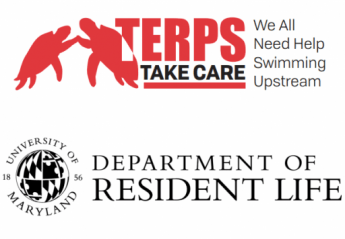Need some essential living items, like kitchenware or small appliances? We’re excited to connect you with Lisa Alexander, Coordinator for Sustainability Programs and creator of the Terp to Terp Campus Reuse Store. Terp to Terp is an incredible resource for all UMD students, providing support for basic needs in a perfect circle of economic justice and sustainability.
TTC: Welcome to the Terps Take Care newsletter, Lisa! We’re absolutely delighted to have this opportunity to interview you about the Terp to Terp Campus Reuse Store. We’re so excited to learn more about it, and how it can help students! Can you start by telling us what, specifically, Terp to Terp offers students? And how can Terps access it?
- LA: [We offer] free, unused, or gently-used essential living items in the categories of kitchen accessories, school supplies, small appliances, and room accessories. We are also hoping to be able to host a clothing swap in the near future. On the Terp to Terp Campus Reuse Store website, you will read through all the important, need-to-know information, which includes how to set up and appointment to shop.
TTC: That seems like it would be incredibly useful, not only to students in need, but on a broader scale as well.
- LA: Being a student/someone in need is very broad. You should very much take advantage of all that a community or university in this case has that can help you in any area of essential needs. Often students will tell me, “I do not want to take something from someone who is more in need.” It you need the item, take it. Our assistance is not here to judge you or put you on a spectrum of need.We know that student hunger is closely linked to other facets of financial insecurity. At the University of Maryland, 20% of our students are food insecure and lack reliable access to nutritious food (with another 21% at-risk), according to the Food Access and Student Wellbeing Study (https://studentaffairs.umd.edu/student-life/food-access-student-well-being-study). An estimated 8,000 UMD students not only experience hunger but also related and significant vulnerabilities and barriers to their health and wellbeing. Additionally most if not all students are accruing debt while working to secure undergrad or graduate degrees. Being able to table a little bit of the financial burden away from students by providing living essentials for free is much needed.
Environmentally our consumer culture puts a lot of items into the landfill. It is well known that landfills and incinerators are close to communities that take on the burden of the health concerns that arise due to this environmental injustice. It is important that have programs that are socially responsible that remove unused or gently used items from the waste stream. This we hope will influence our students create a more circular approach to how we consume.
TTC: This is honestly an amazing resource, and I’m sure is incredibly valuable to our individual students and our local and global communities. I happen to know that you’ve been working on this and related projects for some time – would you care to share with everyone how Terp to Terp officially got started?
- LA: Based on recently campus studies, it became more clear that a large sum of our students are financially insecure. We have been collecting thousands of tons of useable goods and donating them to other organizations for years. Campus never had storage. During the pandemic it become even more abundantly clear that we needed to push forward with figuring out how to retain items to get them back in student hands. So we found some space.
TTC: Is there anything else you’d like students to know about the Terp to Terp Campus Reuse Store specifically?
- LA: Student are also able to donate unused or gently used items to Terp to Terp throughout the year. We have a drop off location at the Campus Pantry. They can also email us at terptoterp@umd.edu to ask about donating.
TTC: How about social media accounts to check out?
TTC: Thank you so much for your time, Lisa. We often like to ask one more question of our interviewees, if you’re willing to share: what do you do to maintain your balance and wellness?
- LA: I run a flower farm that takes me out into nature with my hands in the soil. Putting together flower bouquets is like coloring a picture that will being joy to someone. Also lots of dog cuddles with my two Goldendoodles Walter and Lillian. They help me pay less attention to stress!
